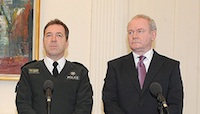
British forces in Ireland are said to be increasingly concerned at the technical capacity of breakaway IRA groups following Saturday’s killing of a PSNI man in a limpet-mine attack in County Tyrone.
They believe the armed groups are becoming increasingly sophisticated in their bomb-making capability, while describing the device that killed 25-year-old Ronan Kerr in Omagh as “powerful”.
The PSNI and MI5 fear the breakaway groups are using under-car bombs that are smaller and more difficult to detect.
No group has yet admitted responsibility, but graffiti has appeared in different areas to claim the attack in name of the east Tyrone IRA.
A massive media campaign has seen intense efforts to marginalise and identify those responsible. A number of raids and arrests have already been carried out in both parts of Ireland and in Scotland, while a fifty thousand pounds reward has been offered from the British exchequer.
Among the organisations to have condemned the killing was the Gaelic Athletics Association, of which Kerr was a member. A number of GAA football matches in the North observed a minute’s silence on Sunday.
In one of the most high-profile statements, the Six-County Deputy First Minister, Martin McGuinness stood alongside PSNI Chief Matt Baggott and DUP leader Peter Robinson to oppose the dissidents.
At Stormont Castle to condemn the attack -- in a similar manner to how he controversially described dissidents as “traitors” two years ago -- McGuinness said the breakaway IRA groups were waging a “useless war against peace”.
McGuinness said he wanted to send out a message of “defiance” to the dissidents that their actions would not destabilise the political process.
He said he was absolutely united with the DUP and with all the other northern parties and with the PSNI.
“Let those people who perpetrated this be totally and absolutely aware, that we are not going away.
“We represent the people. I represent the people of County Tyrone. I represent the people of Ireland,” he said. “We are the people who will prevail.”
Sinn Fein President Gerry Adams yesterday opened his party’s Assembly election campaign in Belfast with a pledge to work to further the political process in defiance of “unrepresentative groups”.
“We stand here determined to keep making politics work. To keep defending the political institutions, and keep delivering for ordinary people and demonstrating what true republicanism is about.”
Sinn Fein is running 40 candidates across all 18 Six-County Assembly constituencies, and is hoping to build on the 28 seats it won in the 2007 election.
Mr Adams, surrounded by candidates, outgoing Assembly members and TDs, said his party must stand by the North’s institutions.
Turning to Sinn Fein’s Assembly record since the last election four years ago, Mr Adams said his party had delivered on its promise of political change, progress towards Irish unity and practical help for the electorate.
He rejected claims by Ulster Unionist leader Tom Elliott that Sinn Fein had information about dissident groups which had yet to be passed to the PSNI.
“Don’t make assumptions that Sinn Fein knows information.”
In Belfast Mr Elliott said: “There are people within the mainstream Irish republican movement who know who these people are that are responsible for this and similar actions; they must also come forward and give that information to the police.”
![[Irish Republican News]](https://republican-news.org/graphics/title_gifs/rn.gif)
![[Irish Republican News]](https://republican-news.org/graphics/title_gifs/harp.gif)

